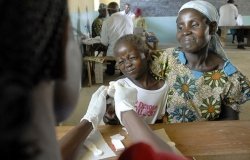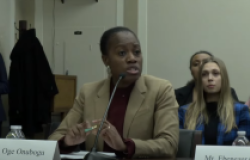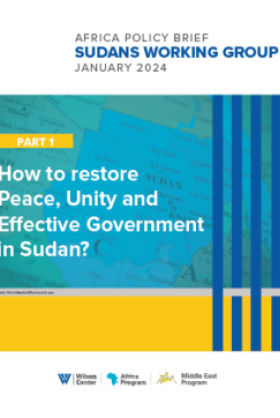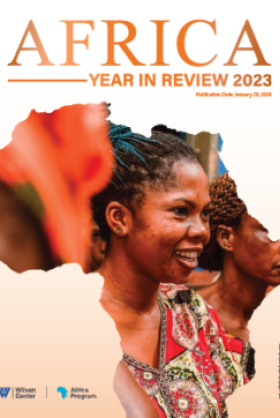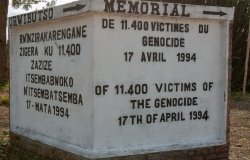Roundtable Discussion with the Honorable Emmanuel E. Uduaghan, Executive Governor for Delta State, Federal Republic of Nigeria
The Honorable Emmanuel E. Uduaghan, Executive Governor for Delta State, Federal Republic of Nigeria; Moderator Peter Lewis, Associate Professor and Director, African Studies Program, SAIS, John Hopkins University
Overview
The complex relationship between ethnicity and politics has been a principal determinant of the character of African politics in the post-independence era. Central to this dynamic are questions of power and resource control. While recent history provides innumerable examples of tension involving these various factors throughout Africa, one of the most visible struggles has been that of Nigeria. On Friday September 4, 2009, the Africa Program of the Woodrow Wilson International Center for Scholars, in conjunction with the African American Unity Caucus, hosted a panel discussion featuring the Executive Governor of the Delta State, Emmanuel Uduaghan.
To contextualize the discussion Governor Uduaghan provided a brief history of Nigeria's recent security crisis, arguing that as one of the three primary states that constitute the vital Delta territory, the densely populated Delta state is critical to both the sub-region and the country as a whole. The area's extensive petroleum infrastructure acts as a vital component of the Nigerian economy, supporting the activities of several prominent international oil companies, including Chevron and Royal Dutch Shell. However, the massive wealth that has been derived from the area's considerable oil reserves has been a subject of acrimonious controversy among the various ethnic groups that inhabit the region. Interethnic rifts, centered on the issues of land ownership and resource control and distribution, have been manifested through violence, resulting in the proliferation of small arms and other materials necessary to equip and sustain armed militias in the area.
While ethnic tensions remain volatile, much of the local discontentment is directed toward the government and the international oil companies operating in the Delta region. Many Nigerians assert that the government is poorly managed and both fiscally and politically incompetent, as well as being outrightly corrupt. Oil companies, on the other hand, are criticized for a lack of oil revenue reinvestment into local communities, discriminatory employment policies, and blatant disregard for the environmental impact of drilling operations. The result has been that the armed militias have attacked oil installations in retaliation, crippling both the oil companies and the national government and bringing petroleum extraction, an essential component of the Nigerian economy, to a standstill.
Ultimately, according to Governor Uduaghan, the solution to instability in the region lies in security, reconciliation, inclusion, and resource distribution. Throughout his term as Executive Governor, he has encouraged dialogue rather than enforcement as an effective policy to curb violence perpetrated by the militias. Following a model adopted by NGOs in Belfast, the organization known as the Delta State Waterway Security Commission has employed youths formerly involved in militant groups with the aim of achieving improved interethnic relations while ensuring the security of the vital waterways in the area. This strategy supports the one of the governor's main principles for the successful resolution of the crisis: enfranchisement and inclusion. He has gotten belligerent actors "out of the creeks" by granting amnesty to former militants and allowing them to participate in the re-stabilization process. Through this process, the government has ensured that there is a greater sense of involvement and agency on the part of the people.
Beyond simply including former militants in the security effort, Governor Uduaghan stressed the importance of providing an economic arrangement that benefited the local population to ensure lasting stability. International oil companies' lack of cooperation with surrounding communities and reluctance to hire employees from the local workforce has exacerbated the resentment generated by these firms' contamination of the environment and the paltry reinvestment of oil revenues into the region. As a result, illegal bunkering (the theft of oil from company pipelines) by local agents is a major problem. The pervasiveness of this activity reflects not only negative sentiments toward the government and oil companies, but also corruption among corporate employees. Moreover, the profits collected from illegal bunkering are frequently used to purchase weaponry to arm militias, according to Uduaghan, perpetuating the cycle of violent conflict. Economic remedies to this problem must therefore provide enough financial incentive to discourage this behavior entirely.
The governor has thus proposed a bill directed at the petroleum industry that would offer local communities a stake in oil production in order to address some of the economic facets of the Delta's instability. In addition to equally distributing the funds received by the federal government among the states that comprise the Delta region, surrounding villages would obtain a share of corporate petroleum drilling contracts, at rates starting as low as 5% equity. Even with this relatively low amount of income directed toward the community, Uduaghan reasoned, the area's settlements can commence on an economically sustainable path to development that will greatly improve their quality of life.
Despite the various measures undertaken by Governor Uduaghan, much remains uncertain for the Delta region and thus, Nigeria as a whole. The recent acceptance of the national government's amnesty program by top militants offers the opportunity for optimism, but a great deal of progress must be made in order to turn this temporary peace into long-term stability. As the governor has argued, if the Delta's local population is not properly reconciled with the government, included in the decision-making process, and awarded an equitable share of oil revenues, a permanent and harmonious accord may prove to be as elusive as the militias of the Delta's creeks.
Hosted By

Africa Program
The Africa Program works to address the most critical issues facing Africa and US-Africa relations, build mutually beneficial US-Africa relations, and enhance knowledge and understanding about Africa in the United States. The Program achieves its mission through in-depth research and analyses, public discussion, working groups, and briefings that bring together policymakers, practitioners, and subject matter experts to analyze and offer practical options for tackling key challenges in Africa and in US-Africa relations. Read more
Thank you for your interest in this event. Please send any feedback or questions to our Events staff.




